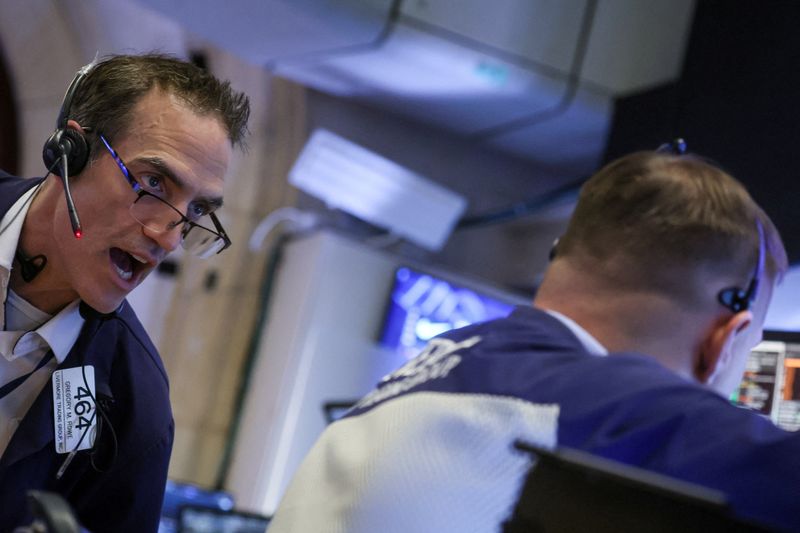By Lewis Krauskopf
NEW YORK (Reuters) -A U.S. stocks rally is leaving behind smaller companies, a sign that investors may be bracing for economic turmoil ahead.
The small-cap Russell 2000 is down about 1% this year, compared to a rally that has boosted the S&P 500, an index representing the largest U.S. companies, 7% year-to-date.
Like the inverted U.S. Treasury yield curve and strength in gold prices, the weakness in shares of smaller companies - which tend to derive profits domestically and be more vulnerable to economic shifts than larger firms - is one of several signs that investors are uneasy about the economic outlook.
Small cap stocks have struggled since turmoil in U.S. regional banks erupted in early March, with the Russell 2000 down 7% since March 8. Investors fear that smaller firms will be hit hard by a potential lending slowdown that could weigh on the broader economy.
Investors are "trying to position their portfolios for what they think is going to happen in the economy," said Eric Kuby, chief investment officer at North Star Investment Management, which specializes in small caps. "Small caps being out of favor is another signal that investors are bracing themselves for an impending recession."
Small caps have tended to waver ahead of economic weakness in the past. Since 1980, the Russell 2000 has lagged the S&P 500 by an average of about four percentage points in the six months after the economic cycle has peaked, ahead of a recession, according to Strategas data.
Economic data has so far shown few signs of a sharp drop-off in growth, though inflation and some other important metrics have cooled. Still, some market participants believe the Fed's 500 basis points of rate increases over the past year are only starting to impact the economy.
"We are likely headed into a recession sometime in the next 12 months," said Michael Arone, chief investment strategist at State Street (NYSE:STT) Global Advisors. "Typically in a recession, small caps underperform."
At the same time, investors worry that banking instability will hurt smaller U.S. companies that rely on loans from regional banks, which have been at the center of the recent crisis.
An April survey by the National Federation of Independent Businesses found 67% of small business owners use a small or regional bank, 17% use a medium-size bank while 14% use a large one. Smaller bank stocks have been hit particularly hard in recent weeks while financials are also more heavily represented in indexes tracking small cap shares, accounting for some of their weakness in relation to the S&P 500.
"What is going on with the banking system is especially a headwind for small and mid-sized corporations," said Sameer Samana, senior global market strategist at the Wells Fargo (NYSE:WFC) Investment Institute (WFII). Last month it downgraded its view on U.S. small caps from "unfavorable" to "most unfavorable."
"For their borrowing, they don't have the same kind of options as maybe a larger firm does," Samana said.
Investors next week will be focusing on economic data including monthly retail sales and earnings reports from companies including Walmart (NYSE:WMT) Inc, Home Depot Inc (NYSE:HD) and Cisco Systems Inc (NASDAQ:CSCO).
Some investors are more upbeat about the outlook for small caps, particularly when looking beyond the next several months.
One reason is that small caps, being sensitive to economic fluctuations, tend to shine early in a market recovery. Of the past six bear markets, the Russell 2000 has posted an average total return gain of 44.8% in the six months following a bear market bottom, versus a 32.2% gain for the S&P 500, according to brokerage Edward Jones.
Small caps are also cheap relative to their history as investors worry that large-cap stocks have become expensive, with the S&P 500's rally this year defying an uncertain earnings outlook.
The small-cap S&P 600 is trading at a price-to-earnings ratio of just over 13 times, compared to its 10-year average of 18.2 times, according to Refinitiv Datastream.

Tim Murray, capital market strategist for the multi-asset group at T. Rowe Price, said the firm is overweight U.S. small-caps in multi-asset portfolios, noting that they have taken "a lot of pain" already amid widespread recession concerns.
"A lot of investors would be nervous right now about leaning into small caps," he said. But "the upside that you get in small caps generally is very front loaded and (comes very quickly after) a recession has been priced in."